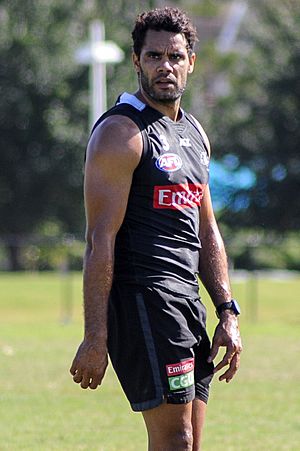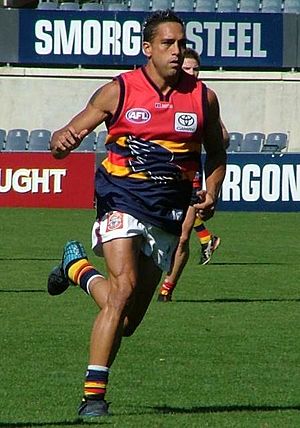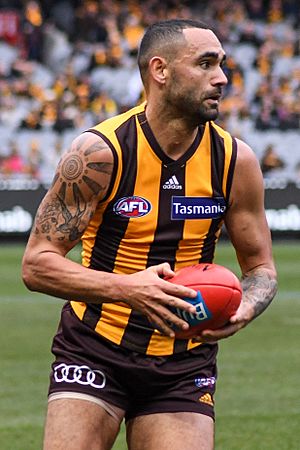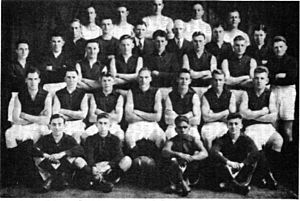Indigenous All-Stars (Australian rules football) facts for kids
Quick facts for kids Indigenous All-Stars |
|
|---|---|
| Names | |
| Full name | Indigenous All-Stars |
| Nickname(s) | All Stars |
| Club details | |
| Founded | 1973 |
| Colours | Black Red Gold |
| Ground(s) | Marrara Oval, Darwin (capacity: 15,000) |
| Traeger Park, Alice Springs | |
| Other information | |
| Official website | [1] |
The Indigenous All-Stars is a special Australian rules football team. It is made up of players who are Indigenous Australian or have an Indigenous background. The team has also been known as the Qantas Kickstart Indigenous All-Stars and the Aboriginal All-Stars.
This team has even represented Australia in the International Rules Series in 2013. This series is a game that mixes Australian rules football with Gaelic football. There are also junior teams (for players under 18 and under 16) called the Flying Boomerangs.
The team first started in Canberra. Since 1993, their main home has been Darwin. The Australian Football League (AFL) supports this team to celebrate the important role Indigenous Australians play in the sport. About one in ten AFL players are Indigenous Australians.
From 2003, the All-Stars usually played a special game every two years against an AFL club. These games were often held in the Northern Territory, at Marrara Oval in Darwin or Traeger Park in Alice Springs. The only time a game was cancelled was in 2011 due to bad weather.
Sometimes, the AFL clubs don't let their best Indigenous players play for the All-Stars, or they limit how much time they can play. Also, the AFL clubs often treat these games as practice matches before their regular season. This means winning isn't as important as getting players fit or trying out new players. Even so, these matches are very popular with fans in the Northern Territory. The game in 2003 had 17,500 people watching, which is still a record for any football game in the Northern Territory.
The best player for the Indigenous All-Stars in these matches receives the Polly Farmer Medal. This award honors a famous player named Graham Farmer.
In 2018, the AFL created an All-Indigenous team for a new, faster version of the game called AFLX. This team was called "Deadly" and was led by Eddie Betts. They played in the 2019 AFLX tournament and won one of their three games. However, many people didn't like the AFLX format, and it was soon stopped.
Contents
History of the Indigenous All-Stars



Teams made up only of Indigenous players have been around since the early 1900s. The first official representative teams started playing after World War II.
Early Matches and Sir Doug Nicholls
After his playing career, Sir Doug Nicholls was very important in creating the idea of an All-Aboriginal team. In 1944, he put together a team of Aboriginal players, mostly from Taree in New South Wales. He was their captain and coach. They played against the Northcote Football Club, and over 10,000 people came to watch. One of the players was James Murray, who also played rugby league for Australia.
The games between Nicholls' team and the Northcote Football Club became a yearly event from 1945 to 1946. These matches inspired similar games to start up across Australia. His team also played a charity match against the Oakleigh Football Club, which attracted 2,000 spectators.
One of the first big wins for an Indigenous team was in 1970. They defeated the Australian Capital Territory team, which was one of the strongest teams in the country, at Manuka Oval in Canberra.
In 1973, a team of the best Indigenous Australian players from all over the country was put together. They went on a tour to Papua New Guinea to play against the Papua New Guinea team. Sir Douglas Nicholls traveled with the team. The Australian team lost by a small margin. A return game was planned for an Aboriginal Australian Rules carnival in Canberra. Papua New Guinea again narrowly beat the Indigenous Australian team at Ainslie Oval.
All-Stars Play Against Top Clubs
In 1983, the All-Stars played a special game in Mildura. Two more games were played in 1985, and another in 1994. A game between the All-Stars and the Sydney Swans was planned for Canberra in 1984 but did not happen.
In 1993, there was a plan for the All-Stars to play against the Collingwood Football Club every two years. However, in 1994, there were problems getting players released from their clubs. For example, the St Kilda Football Club would not let Nicky Winmar play, and the West Coast Eagles would not release Chris Lewis.
By 2015, the All-Stars had won six out of the ten matches they had played. The game with the most people watching was in 2003, when 17,500 fans saw the All-Stars beat the Carlton team at Marrara Oval.
The Future of the All-Stars Match
In 2017, the AFL said they would continue to hold a match featuring the All-Stars. However, they decided to hold it less often, only every four years instead of every two.
In 2018, the AFL created the "Deadly" team for the AFLX tournament. This team was made up of 8 Indigenous players and was captained by Eddie Betts. They played in the 2019 AFLX tournament and won one of their three games. However, many people did not like the AFLX game, and it was soon stopped.
In 2017, the Indigenous players who manage the team decided to schedule the match every four years instead of two. This meant a planned 2019 match was postponed.
Sponsorship and Team Names
Until 2005, the All-Stars team was sponsored by the Aboriginal and Torres Strait Islander Commission (ATSIC). They had the right to name the team. After ATSIC was closed, the team's name changed from Aboriginal All-Stars to Indigenous All-Stars. Since 2006, the team has been sponsored by Qantas through the AFL Kickstart Indigenous program.
Match Results
| Year | Date | Opponent | Result | Stadium | Captain (vice-captain) | Coach | Best (Polly Farmer Medal) | Crowd |
|---|---|---|---|---|---|---|---|---|
| 1973 | 3 October | Lae, Papua New Guinea | Lae 9.12 (66) def All-Stars 9.8 (62) | Lae, Papua New Guinea | Ray Rigney | Dennis Archee | ||
| 1973 | 7 October | Papua New Guinea | Papua New Guinea 17.19 (121) def All-Stars 12.18 (90) | Sir Hubert Murray Stadium, Port Moresby | Ray Rigney | Leo Wanganeen | 6,000 | |
| 1974 | 6 October | Papua New Guinea | All-Stars 12.12 (82) def. by Papua New Guinea 11.13 (89) | Ainslie Oval, Canberra | Ray Rigney | Ralph White | ||
| 1983 | 1 October | Richmond Football Club/Mildura | All-Stars 37.11 (233) def Richmond 14.11 (95) | Sarah Oval, Mildura | Stephen Michael | Michael Wanganeen | Rex Handy | 3,500 |
| 1985 | 16 February | Essendon | Essendon 13.20 (98) def All-Stars 11.16 (82) | Tatura | Stephen Michael | Wilbur Wilson | Unknown | 6,000 |
| 1985 | 13 September | Premier's All Stars | Premier's All Stars 23.12 (150) def All-Stars 10.8 (68) | MCG | Maurice Rioli | Syd Jackson | Ian Barry | 5,333 |
| 1994 | 12 February | Collingwood Football Club | All-Stars 13.10 (88) def Collingwood 10.8 (68) | Marrara Oval, Darwin | Michael McLean | Maurice Rioli | Fabian Francis | 15,000 |
| 2003 | 7 February | Carlton Football Club | All-Stars 19.16 (130) def Carlton 8.9 (57) | Marrara Oval, Darwin | Andrew McLeod | Michael McLean | Adam Goodes | 17,500 |
| 2005 | 5 February | Western Bulldogs | All-Stars 12.19 (91) def Western Bulldogs 10.3 (63) | Marrara Oval, Darwin | Darryl White (Chris Johnson) | Michael McLean | Daniel Wells | 8,500 |
| 2007 | 11 February | Essendon Football Club | Essendon 14.9 (93) def All-Stars 6.7 (43) | Marrara Oval, Darwin | Andrew McLeod | Michael McLean | Andrew McLeod | 13,119 |
| 2009 | 7 February | Adelaide Crows | All-Stars 14.13 (97) def Adelaide 6.7 (43) | Marrara Oval, Darwin | Andrew McLeod (Shaun Burgoyne) | Chris Johnson | Matt Campbell | 9,497 |
| 2011 | 4 February | Richmond Football Club | Match cancelled due to inclement weather | N/A | Adam Goodes | Michael O'Loughlin | N/A | N/A |
| 2013 | 8 February | Richmond Football Club | All-Stars 14.6 (90) def Richmond 6.4 (40) | Traeger Park, Alice Springs | Nathan Lovett-Murray | Michael O'Loughlin | Harley Bennell | 8,350 |
| 2015 | 20 February | West Coast Eagles | All-Stars 5.11 (41) def. by West Coast 7.7 (49) | Leederville Oval, Perth | Shaun Burgoyne (Jarrod Harbrow) | Andy Lovell | Shaun Burgoyne | 10,000 |
Team Squads
These templates show the players who were part of the Indigenous All-Stars squads in different years:
1973 Team Members
The players for the 1973 team included:
- Riger Rigney (SA)
- Michael Mansell (Tas)
- Anthony Miller (WA)
- Brian Warrior (SA)
- Dennis Lewfat (NT)
- Patrick Purantatameri (NT)
- Reg Mathews (QLD)
- Bill Ellis (NT)
- John McHenry (WA)
- Leon Wanganeen (SA)
- Alec Smith (Vic)
- John Pepperill (NT)
- Phillip Archer (SA)
- Ian Charles (VIC)
- Robbie Muir (VIC)
- Ken Liddle (NT)
- Wilfred Wilson (SA)
- Tim Agius (SA)
- Garry Murray (VIC)
- Paul Hansen (WA)
- Lloyd Bray (NT)
International Rules Series
The Indigenous All-Stars have also played in the annual International Rules Series. In this series, they represented Australia in a mixed sport. This sport combines parts of Gaelic football and Australian rules football. For the 2013 Series, a team of 33 players was chosen, and then 21 players traveled for the games:
The Indigenous team lost the 2013 series 2-0. They lost by a large total score of 173 to 72 points.
Polly Farmer Medal
The Polly Farmer Medal is an award given to the best player from the Indigenous All-Stars team in each game they play.
See also
- Flying Boomerangs
- Rugby league Indigenous All Stars
 | Laphonza Butler |
 | Daisy Bates |
 | Elizabeth Piper Ensley |


